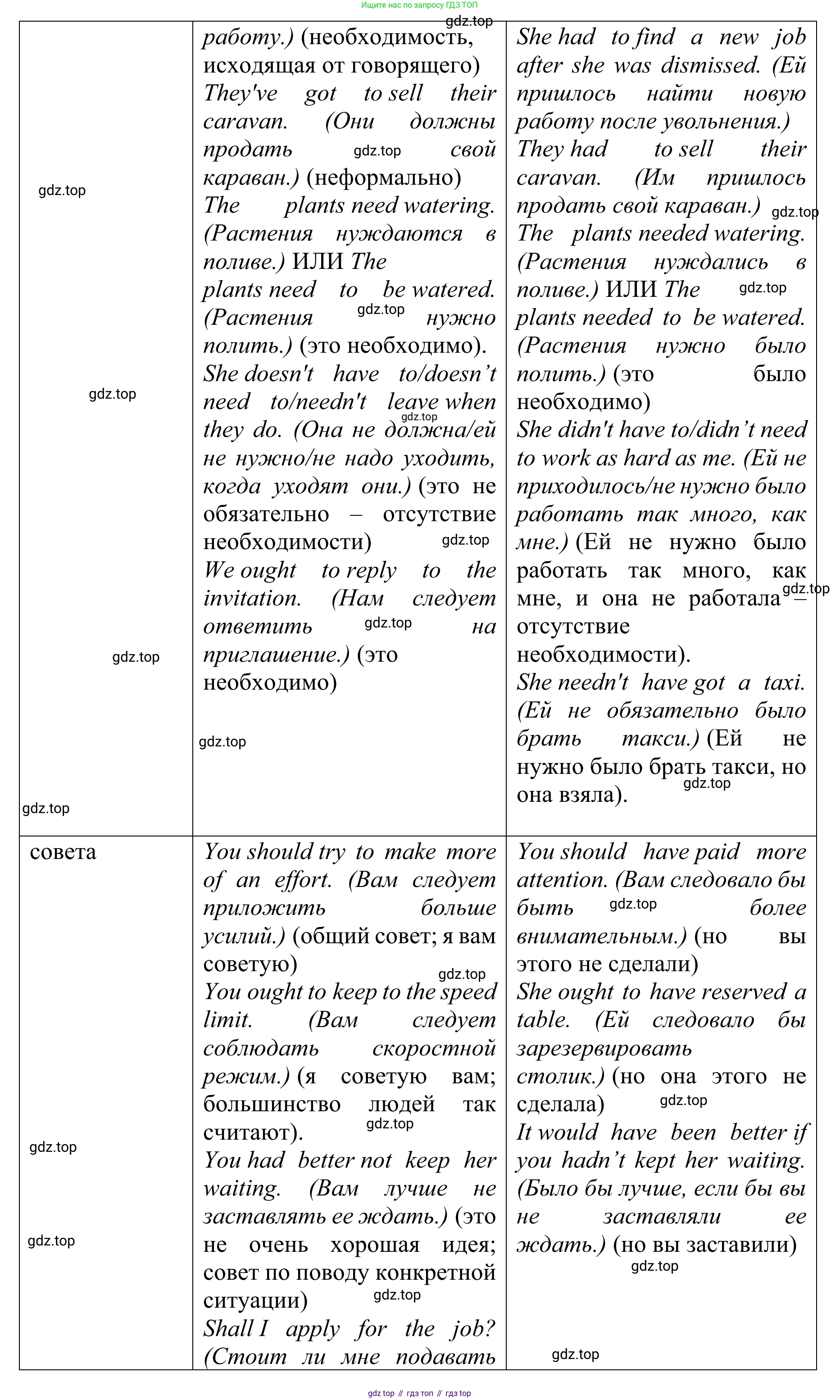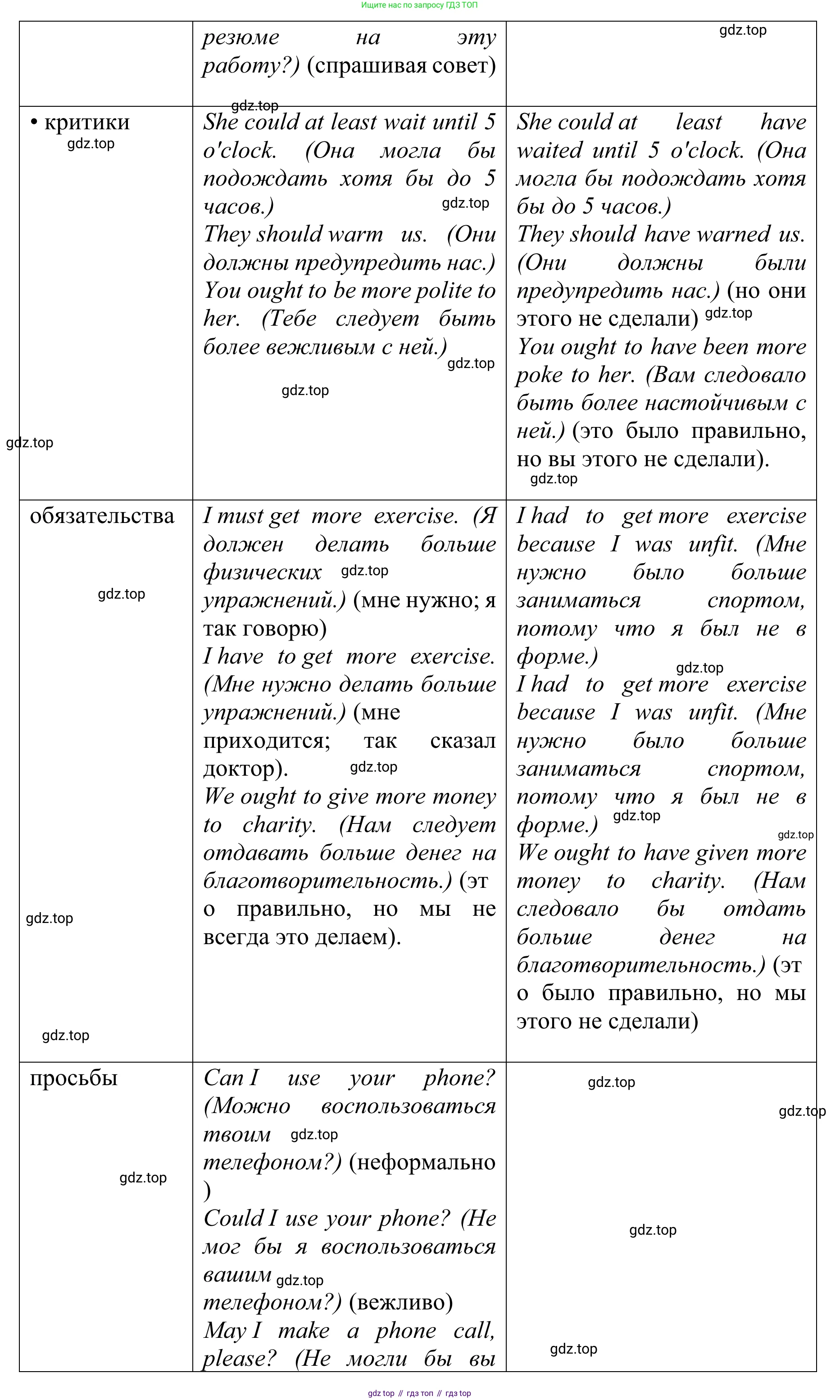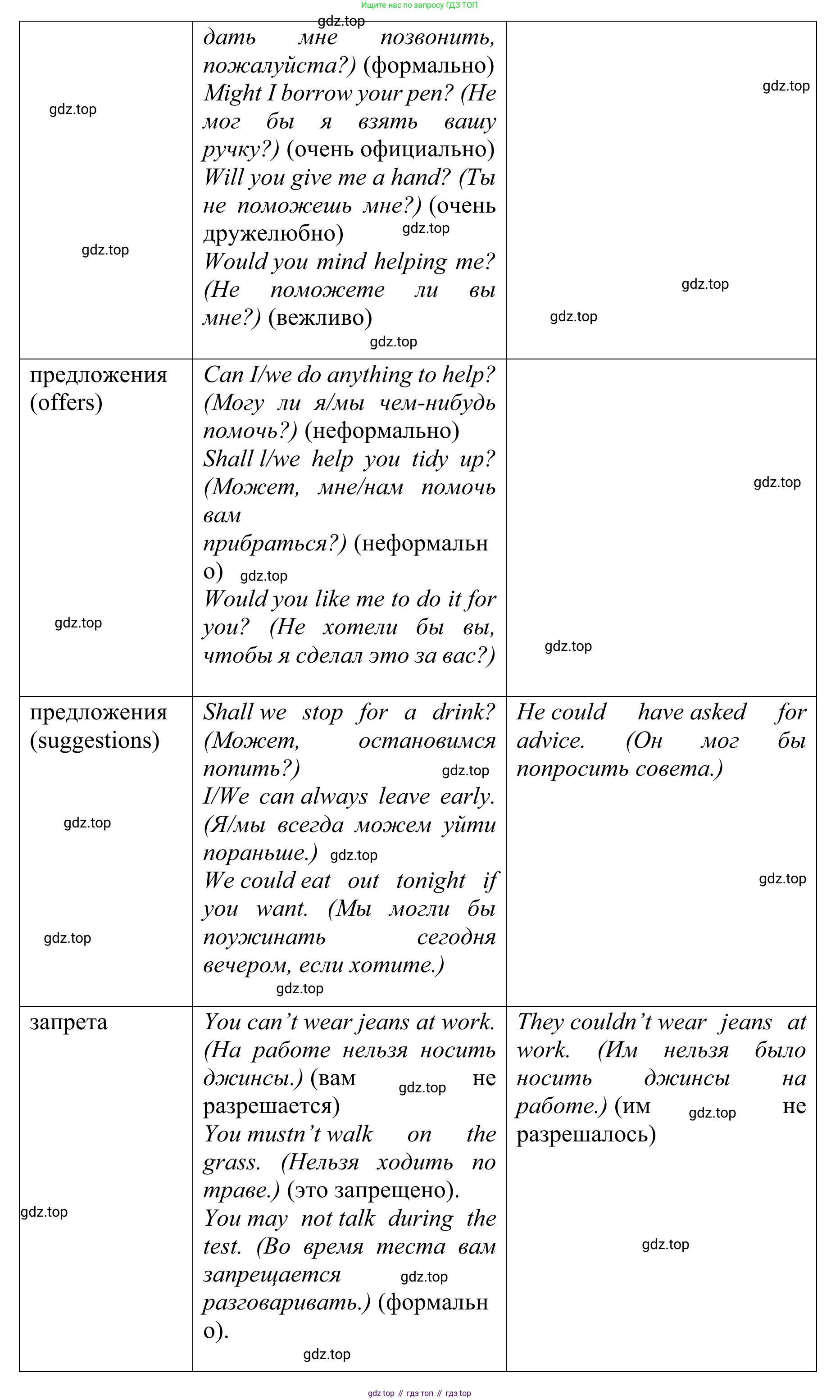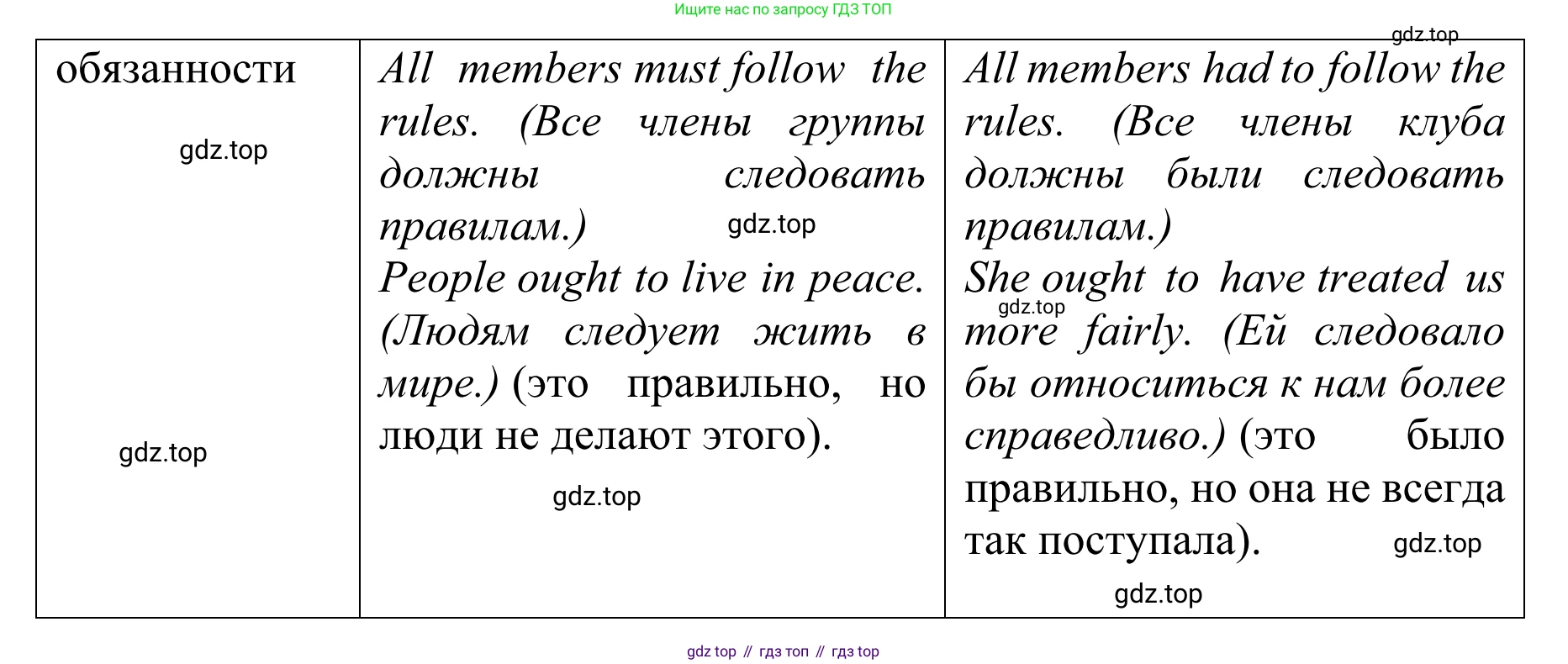Summary of Functions, страница 171 - гдз по английскому языку 10 класс (starlight) учебник Баранова, Дули

Авторы: Баранова К. М., Дули Д., Копылова В. В., Мильруд Р. П., Эванс В.
Тип: Student's book (Учебник)
Серия: starlight (звёздный английский)
Издательство: Просвещение, Express Publishing
Год издания: 2019 - 2026
Уровень обучения: углублённый
Цвет обложки: белый, бирюзовый
ISBN: 978-5-09-112205-3
Допущено Министерством просвещения Российской Федерации
Популярные ГДЗ в 10 классе
Grammar Practice Section. Module 2 - страница 171.
Summary of Functions (с. 171)
Условие. Summary of Functions (с. 171)
скриншот условия


Summary of Functions of Modal Verbs
| Use | Present/Future | Past |
|---|---|---|
| ability | He can speak Japanese. She's able to make people laugh. | He could/was able to speak Japanese. (repeated action – ability in the past) We were able to go on a three-month tour of Australia. (single action) |
| possibility | He can still be at work. (90% certain) She could be angry. (50% certain; it's possible she is angry) Sally may be teaching. (50% certain; it's possible that she's teaching) You might need to come tomorrow. (40% certain; perhaps you need to come tomorrow) It is likely that Sue will give up working. Sue is likely to give up working. | — We could have had an accident. (luckily we didn't) John may have broken that vase. (perhaps he did) Jane might have lost our telephone number. (perhaps she has lost it) It was likely that she had taken the last train. She was likely to have taken the last train. |
| probability | They will be in Spain tomorrow. (100% certain; prediction) We should see him there. (90% certain; future only; it's probable) She ought to be in Canada by now. (90% certain; she will probably be in Canada) | — He should have finished by now. (He has probably finished.) They ought to have started the course by now. (They have probably started the course.) |
| logical assumptions | He must be exhausted. (90% certain – positive; I'm sure he's exhausted) She can't be serious. (negative; I'm sure she's not serious) They couldn't be on holiday. (negative; I don't think they are on holiday) | He must have won the competition. (positive; I'm sure he has won the competition) She can't have married Ted. (negative; I'm sure she didn't marry Ted) They couldn't have been friends. (negative; I don't think they were friends) |
| permission | You can/can't have a party. (giving or refusing permission; informal) Could I be excused? (polite; asking for permission) You may be excused. (formal; giving permission) Might I bring a friend to the wedding? (more formal; asking for permission) I'm afraid you can't/mustn't have visitors. (informal; refusing permission) Guests may not smoke in their rooms. (formal; refusing permission – written notice) | He wasn't allowed to/couldn't board the plane. He was allowed to see the patient. (NOT: could) — — — — |
| necessity | I must return these books soon. (I say so) She has to find a new job. (necessity coming from outside the speaker) They've got to sell their caravan. (informal) The plants need watering. OR The plants need to be watered. (it's necessary) She doesn't have to/doesn't need to/needn't leave when they do. (it isn't necessary – absence of necessity) We ought to reply to the invitation. (it's necessary) | I had to return the books to the library. (I was obliged to) She had to find a new job after she was dismissed. They had to sell their caravan. The plants needed watering. OR The plants needed to be watered. (it was necessary) She didn't have to/didn't need to work as hard as me. (it wasn't necessary for her to work as hard as me and she didn't – absence of necessity) She needn't have got a taxi. (it wasn't necessary for her to get a taxi but she did) |
| Use | Present/Future | Past |
|---|---|---|
| advice | You should try to make more of an effort. (general advice; I advise you) You ought to keep to the speed limit. (I advise you; most people believe this) You had better not keep her waiting. (It's a good idea; advice on a specific situation) Shall I apply for the job? (asking for advice) | You should have paid more attention. (but you didn't) She ought to have reserved a table. (but she didn't) It would have been better if you hadn't kept her waiting. (but you did) — |
| criticism | She could at least wait until 5 o'clock. They should warn us. You ought to be more polite to her. | She could at least have waited until 5 o'clock. They should have warned us. (but they didn't) You ought to have been more polite to her. (It was the right thing to do, but you didn't do it.) |
| obligation | I must get more exercise. (I need to; I say so) I have to get more exercise. (I'm obliged to; the doctor says so) We ought to give more money to charity. (It's the right thing to do, but we don't always do it.) | I had to get more exercise because I was unfit. I had to get more exercise because I was unfit. We ought to have given more money to charity. (It was the right thing to do but we didn't do it.) |
| requests | Can I use your phone? (informal) Could I use your phone? (polite) May I make a phone call, please? (formal) Might I borrow your pen? (very formal) Will you give me a hand? (very friendly) Would you mind helping me? (polite) | — — — — — — |
| offers | Can I/we do anything to help? (informal) Shall I/we help you tidy up? (informal) Would you like me to do it for you? | — — — |
| suggestions | Shall we stop for a drink? I/We can always leave early. We could eat out tonight if you want. | — — He could have asked for advice. |
| prohibition | You can't wear jeans at work. (you aren't allowed to) You mustn't walk on the grass. (it's forbidden) You may not talk during the test. (formal) | They couldn't wear jeans at work. (they weren't allowed to) — — |
| duty | All members must follow the rules. People ought to live in peace. (It's the right thing to do, but people don't do it.) | All members had to follow the rules. She ought to have treated us more fairly. (It was the right thing to do but she didn't always do it.) |
Решение 1. Summary of Functions (с. 171)







Решение 3. Summary of Functions (с. 171)
Какой вопрос представлен на изображении?
Ответ:
There is no question in the provided image. The image displays a table titled "Summary of Functions of Modal Verbs", which explains their use in English for various contexts in the present, future, and past tenses.
На предоставленном изображении нет вопроса. На изображении представлена таблица под названием "Сводка функций модальных глаголов", которая объясняет их использование в английском языке в различных контекстах в настоящем, будущем и прошедшем времени.
Другие задания:
Помогло решение? Оставьте отзыв в комментариях ниже.
Присоединяйтесь к Телеграм-группе @top_gdz
ПрисоединитьсяМы подготовили для вас ответ c подробным объяснением домашего задания по английскому языку за 10 класс, для упражнения Summary of Functions расположенного на странице 171 к Учебник (Student's book) серии звёздный английский , starlight (старлайт) 2019 года издания для учащихся школ и гимназий.
Теперь на нашем сайте ГДЗ.ТОП вы всегда легко и бесплатно найдёте условие с правильным ответом на вопрос «Как решить ДЗ» и «Как сделать» задание по английскому языку к упражнению Summary of Functions (с. 171), авторов: Баранова (Ксения Михайловна), Дули (Дженни ), Копылова (Виктория Викторовна), Мильруд (Радислав Петрович), Эванс (Вирджиния ), ФГОС (старый) углублённый уровень обучения учебного пособия издательства Просвещение, Express Publishing.



















